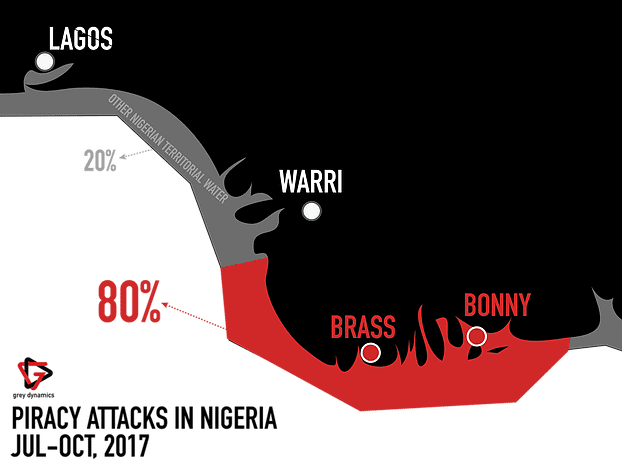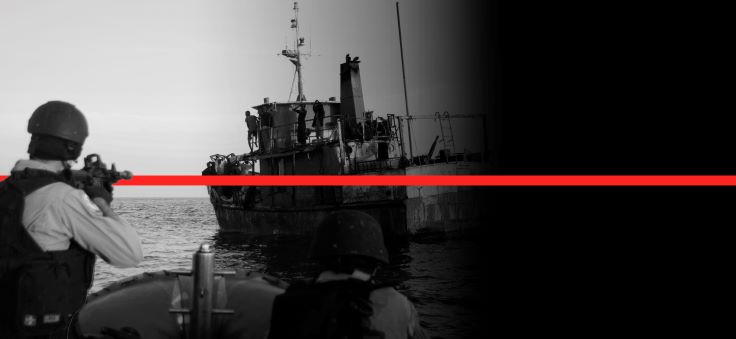CTF 151 is a multinational task force established to conduct counter-piracy operations under a mission-based mandate throughout the CMF area of responsibility to actively deter, disrupt and suppress piracy in the Gulf of Guinea in order to protect global maritime security and secure freedom of navigation for the benefit of all nations.
Key Judgements
- Piracy in the Gulf of Guinea is likely to decline over the next 18 months
- Gulf of Guinea pirates have almost certainly changed tactics.
a. Tactics are changing from theft of tankers with intent to sell the products to kidnap for ransom (KFR) operations.
- It is likely the transition in tactics is motivated by concerted international counter-piracy patrolling and falling oil prices.
a. KFR operations are judged highly likely to be considered a more cost-effective tactic.
- There is a realistic possibility that judgements 2 & 3 mean pirates are on the defensive, further supported by a shorter operating range from shore (down by 20nm/15% from 2016) and an increased reliance on waterways.
Background

The Gulf of Guinea remains beset by the issue of piracy. While piracy is on the decline worldwide, the Gulf remains vulnerable. The number of attacks in 2017 was lower than in 2016. However, the number of kidnap victims taken during the year was higher than in previous years. Despite a concerted effort by multinational naval forces, the International Maritime Bureau’s latest report lists 121 attacks in 2017. 20 took place in Nigerian territorial waters. Regional militant groups in the Niger Delta primarily conduct piracy in the region. An example is Niger Delta Avengers, which obtains funds in this way.
Tactics, weapons and operating range

Pirate attacks usually consist of 1-2 speedboats carrying 3-15 crew-carrying small arms. There have been reports of crude improvised explosive devices (IEDs) consisting of tin cans and fuses. Given the IED’s failure to detonate, it is likely that the particular group lacked demolition expertise. There has been only one attack involving IEDs or other explosives. It is a realistic possibility that the pirates lack the knowledge or are unwilling to risk using explosives in KFR operations. Instead, pirates rely on aluminium ladders and grappling hooks to board ships. Once on board, they go to the bridge while destroying communications equipment and stealing valuables. The pirates usually select their kidnap targets based on rank, where known. The longest-range successful attack took place 60 nautical miles from the Nigerian shore. Attempts in 2017 have ranged up to 110 nm from the coast.
Counter Piracy in the Gulf of Guinea
Current countermeasures against piracy in the Gulf of Guinea are focused on naval deployments and operations like Nigeria’s Tsare Teku. The latest news is a set of measures Nigeria took, including a partnership with the French navy for an exercise and the commissioning of an Israeli company to train troops and patrol the Nigerian waterways. Other states in the Gulf of Guinea are improving their naval forces as regional cooperation is enhanced. However, not all countries have allocated the same level of priority to maritime security, as Liberia, Sierra Leone, and Guinea lack sufficient naval forces to monitor their territorial waters. Regional forces come together for military exercises in the Obangame Express – the U.S.-led initiative to improve maritime security in the Gulf of Guinea.
Commercial security measures against Piracy in the Gulf
A continued Nigerian ban on using private military security contractors (PMSCs) means that merchant ships are forced to hire more expensive licensed escort vessels or risk pirate attacks. The European Community Shipowners Association has called for this ban to be overturned, as it is believed PMSCs would reduce pirate attacks. EOS Risk’s data indicates that in 2016, pirates boarded only one vessel with armed security. The contrast between 2009 and 2015 rates of attacks reported by IMB for Somali pirates indicates the success of the 2011 decision to allow PMSCs to guard merchant vessels.
Future Implications of Piracy in the Gulf of Guinea
It is unlikely that the current multinational efforts will be sufficient to counter piracy in the Gulf of Guinea. Pirates can use the Niger Delta waterways to hide and conduct attacks. Naval patrolling and licensed escort vessels have reduced the number of attacks by intercepting pirates. This has driven pirates to operate closer to the shoreline. This approach limits piracy opportunities by increasing patrols and surveillance. Nonetheless, it does not solve the underlying problem, as ships remain vulnerable to pirates. As international cooperation and regional maritime forces are built up, there will be a gradual reduction in pirate attacks. Increasing regional stability in the Niger Delta would remove credibility from militant groups relying on piracy.
Premortem Analysis
This assessment is contingent on several assumptions. First, the oil price remains stable. Second, the national bans on PMSCs in the Gulf of Guinea stay in place. Fluctuations in the oil price would affect Nigeria’s economic recovery after the 2016 slump, as Nigeria relies on continued oil exports. Production of oil in the Niger Delta is particularly vulnerable to militants, and it is one of the primary targets of regionalist groups like the Niger Delta Avengers. Fluctuations in the oil price would thus impact the Nigerian economy, weakening the region’s security. The European Community Shipowners Association is currently campaigning to overturn the ban on using PMSCs in the Gulf of Guinea. Should this succeed, there is evidence from the Somali counterpiracy efforts that it would have a significant impact.

